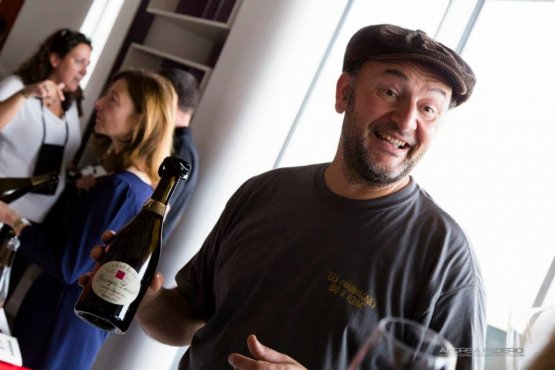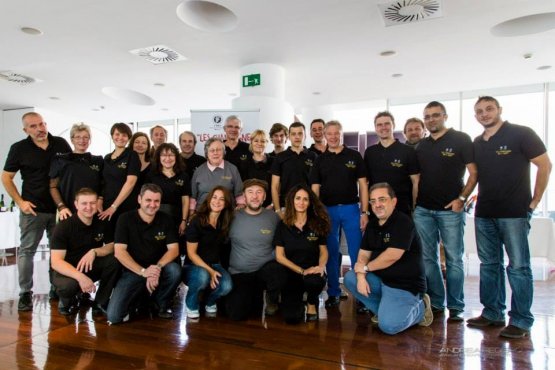Common places are hard to overcome, even when it comes to wine and food. Speaking of Champagne producers, for instance, one would imagine the descendants of prestigious maisons in their castles, strict chefs de cave or perhaps adventurous sales people such as Charles Heidsieck in the TV film Champagne Charlie. When meeting a friendly big man such as Vincent Laval, and tasting his Champagne while looking at his straightforward eyes and his large hands one then understands that even this mythological wine – just like all others – is born from the earth.
Vincent says that in Cumières, the village in the Marne where since 1964 his family has been producing grapes, they are 5 people at work in the 2.5 hectares of vineyards and in the cellar, keeping old and new vineyards with “pleasure, respect, attention”. And indeed respect, and the clear expression of the territory, represent the leitmotiv uniting the wineries that flew to Italy’s capital for Les Champagnes Bio in Rome, the event organised on October 26th by the team of 99 Champagne (the guide to the best Champagne maisons, by Edizioni Estemporanee) with the Association des Champagnes Biologiques.

Georges Laval was one of the pioneers of organic Champagne. Today his son Vincent continues along this road (photo by Andrea Federici)
Created in 1998 by some wine producers who were organic Champagne pioneers – including
Georges Laval, father of
Vincent, and
Jacques Beaufort – the
ACB today includes 22 certified members, among tiny maisons and big names, and many “sympathizers” who are now converting their vineyards. Considered in the Seventies as heretics who dared turning Champagne’s tradition upside down, these producers later convinced many others that it is possible to produce organic wines with excellent results.
The world of organic Champagne is growing, both with regards to production and to the attention of the market – even in Italy, while of course we are speaking of a niche, given the small quantities – but for many this is a choice based on ethics, not interests. Therefore many of the tasters of
99 Champagnes do not hid a particular love for this kind of bubbles, and for those who make them.
We asked
Alfonso Isinelli, a historian with a passion for wine and Champagne and curator of the guide to tell us what are the most fascinating characteristics and in which way an organic Champagne differs from a traditional one.

Group photo with the wine producers who were in Rome last October 26th (photo by Andrea Federici)
«Beside the great commitment required by organic production, with an obsessive selection of the grapes, a constant work in the vineyard and in the cellar, though without “adding” anything, sometimes not even a gram of sulphur one needs to take into consideration the risk, with is decisively bigger for those who often have small vineyards and don’t “protect” it as in the case of traditional viticulture –
Alfonso explains –. Even the low level of sulphur, which contrasts oxidation and other stabilization problems, in Champagne more than in still wines puts at risk what is inside the bottle. These producers, however, did not give up and have reached excellent results: organic Champagne focuses on respect for the territorial identity – whether we’re speaking of Marne, a classic area of Champagne, or Aube – and on the characteristics of each grape variety: chardonnay, pinot noir and pinot meunier. This does not mean that they are better than traditional Champagnes, among which there are of course some very great wines, but the typical notes of each single grape variety and of the terroir or cru are certainly often more defined. Besides, also thanks to the lower use of sulphur, they are more “drinkable”: after years of tasting, I can say that tasting them is less tiring than classic Champagnes!»
In other words, the choice of organic or biodynamic production turns out to be a winning one and is now beginning to convince even some large maisons such as
Rœderer, which began the conversion of some vineyards:
Cristal, in particular, will be entirely produced with grapes grown in a biodynamic system.